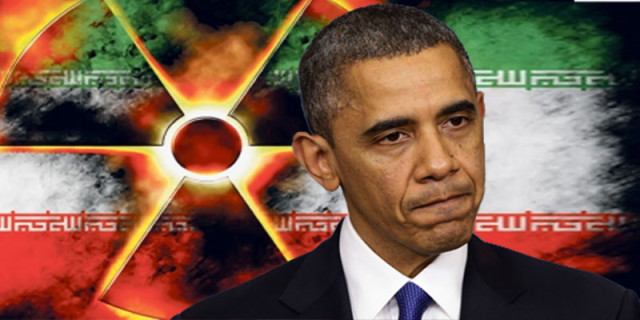U.S. Iran Brinkmanship
Like everyone else, I wonder what is going on with Iran. Whatever it is, it just does not bode well for the US, my adopted country. My country of birth, Iran, used to be my proud homeland of noble people, is now a cabal of turbaned religious bigots who took it over some four decades ago and overnight transformed a country that was once the envy of the entire Middle East into a pariah of the world.
President Trump honored his campaign pledge to withdraw from the misguided and dangerous deal the Obama administration made with the Iranian Mullahs on the nuclear issue. Some say that was a bad thing. Others say, it was a good thing to chuck it and aim for a much better and safer agreement.
Now that debate is academic, the United States of America is no longer party to that flawed agreement. The United States did not just leave by closing the door, but proposed a new deal to the Mullahs that had exactly zero chance to succeed
President Trump seems to believe that he is dealing with a group of rational pragmatic people like others he has dealt with in the world of business. A sort of give and take type of people who can find middle ground on any deal. The Mullahs are hardly the type. They are religious fanatics to their very core who are driven — now that they are in power and sit on a sea of black gold — by their deadly messianic dream to rule the world by whatever means, piecemeal or whole, intact or in shambles. Preferably in shambles so that their long-awaited and prayed-for Saheb-u-zaman (their messiah)— from his hiding place and returns and set the world straight in accordance with the idealized Shia Islamic vision.
To Islam, Death is not death. It is martyrdom — the prized achievement earning the martyr eternal peace in fabled paradise. To these cultists, Muhammad’s son-in-law, Imam Hossain is their idol and his tragic death is what they follow. They believe in the same way that Imam Hossain with a small band of his followers stood up to the usurper Yazid, they are doing the same thing at all costs battling the Great Satan (the USA).
This cult of death is on the march and in its forty years of Islamic rules has murdered tens of thousands of Iran’s best children who dared to oppose its criminal agenda.
At this point this game of chicken has played out to the Mullahs’ highest advantage. The Saudis, with their huge arsenal of fancy weapons and the world’s third highest military expenditure are just licking their wounds not even daring to name the Mullahs as the villains who bombed their lifeline. And the Saudi’s patron, the United States, shrugs and says it is the Saudi’s place to respond and it would support that. The Saudis blinked, ergo the United States blinks.
As things stand now, the Mullahs have gained incalculable prestige in the region. They have time and again poked the big tiger in the eye and the big tiger blinked and didn’t bite. What’s the lesson to everyone? The tiger is really a paper tiger. Poke it and see for yourself.
And how this brinkmanship is likely to play out? It could trigger a full war. Not just simply the parties giving each other a bloody nose and go back to a line of less cataclysmic confrontation. This is very unlikely. The Mullahs lifeline is hugely constricted and that will not do. They will do whatever they can to open that oil-finance lifeline. A more likely possibility is so called diplomacy.
The United States took a huge risk trying to undo the massively-flawed nuclear deal. The Mullahs refused. Therefore, the United States not being remotely inclined to use force, will take the diplomatic route. Meaning overtly and covertly, the United States backtracks, eases the sanctions, and the Mullahs gleefully celebrate their partial victory waiting and hoping another Democrat president takes the helm. After all, the Mullahs believe Democrats are the nice folks who see it their way. It was that very nice Jimmy Carter who catapulted the villain Khomeini to power. Recall that Carter even called Khomeini, a “saint.”
And yes. Another very nice and understanding Democrat President — the winner of the Nobel Peace Prize granted the Mullahs the right to make their own nuclear bomb if they could only wait a few years. He, Obama even sweetened the deal giving the Mullahs a starter fund of hundred and fifty billion dollars.
What is going on with Iran? Some speculations on my part:
Trump, rightly or wrongly left the nuclear deal with Iran demanding new terms that were tantamount to surrender to the Mullahs. So, they said, Hell no. Trump started to turn the economic screws on the Mullahs that began to shut down their oil sales — their life-blood.
The Mullahs had a choice: either die slowly by the U.S. sanctions that not only prevented selling oil, but also shut down their ability to deal in international banking, or playing hardball with Trump. In a way, they decided to take a chance and go down fighting, if it is necessary.
The Mullahs figured, Trump is more bluster than fight, as evident from his inaction when they shot down an American drone in international airspace. Teddy Roosevelt advised: speak softly but carry a big stick. The Mullahs see President Trump speaking loudly while carrying no stick at all.
They also figured that re-election coming up would make Trump most hesitant to unleash his military on them. Furthermore, Trump might get bounced and the Democrats will again come around and be nice to them.
Now, they have called their opponents’ bluff with great success. They have made their point: they have said time and again, if we can’t sell our oil, then we will not let anybody else sell their oil through the Gulf. Saudis making money hand over fist selling oil while the Mullahs starving? No, that’s not very nice. They decided they would do something about that. Knowing full well that those Saudi boys have no stomach at all for entangling with Iran militarily.
Now what? Simple. This time Trump lost. Next, Trump will relax the sanctions, will even look the other way for the Mullahs to sell some oil, access to the international financial system will also quietly work out and a covert “diplomacy” dance will continue.
The result: a huge victory for the Mullahs and a new long term lease on life. I certainly hope I’m wrong as I see it.













 One film Muslim Journeys is being shown at the John F. Germany Public Library on October 12th. It is about “an African-Muslim prince who was captured and sold into slavery in the American South.” However, there are no books on the reading list by South African-born
One film Muslim Journeys is being shown at the John F. Germany Public Library on October 12th. It is about “an African-Muslim prince who was captured and sold into slavery in the American South.” However, there are no books on the reading list by South African-born